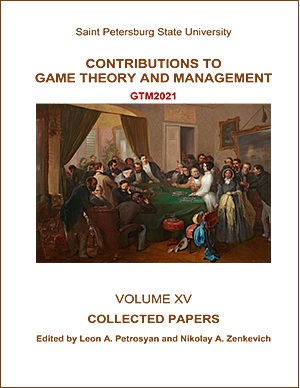Online-Offline Competition with Heterogeneous Consumers: An Example for No Existence of Pure Strategy Nash Equilibrium
DOI:
https://doi.org/10.21638/11701/spbu31.2022.04Abstract
Keywords:
online versus offline, price competition, salop model, heterogeneous consumers, existence of equilibrium
Downloads
References
Downloads
Published
How to Cite
Issue
Section
License
Articles of "Contributions to Game Theory and Management" are open access distributed under the terms of the License Agreement with Saint Petersburg State University, which permits to the authors unrestricted distribution and self-archiving free of charge.




